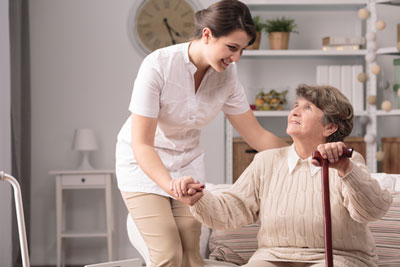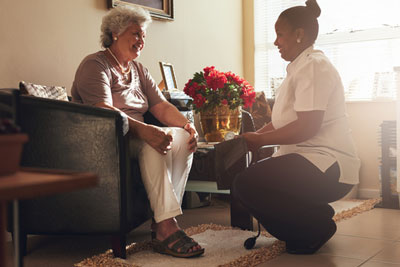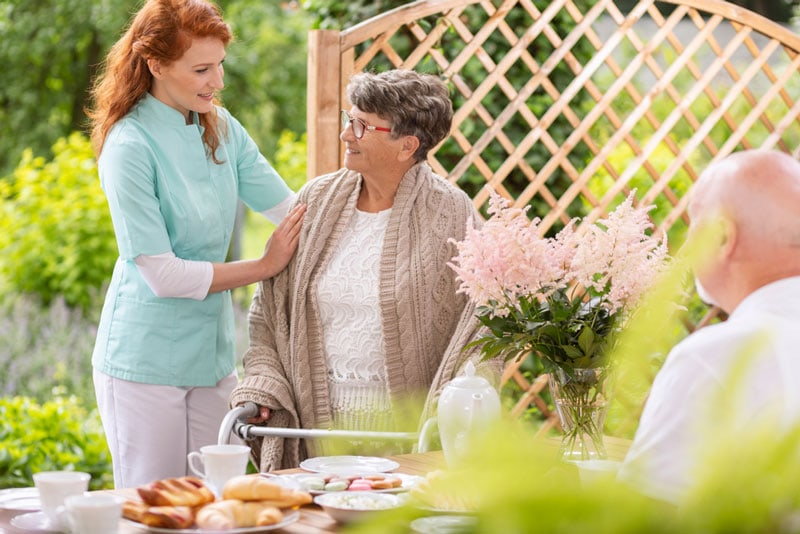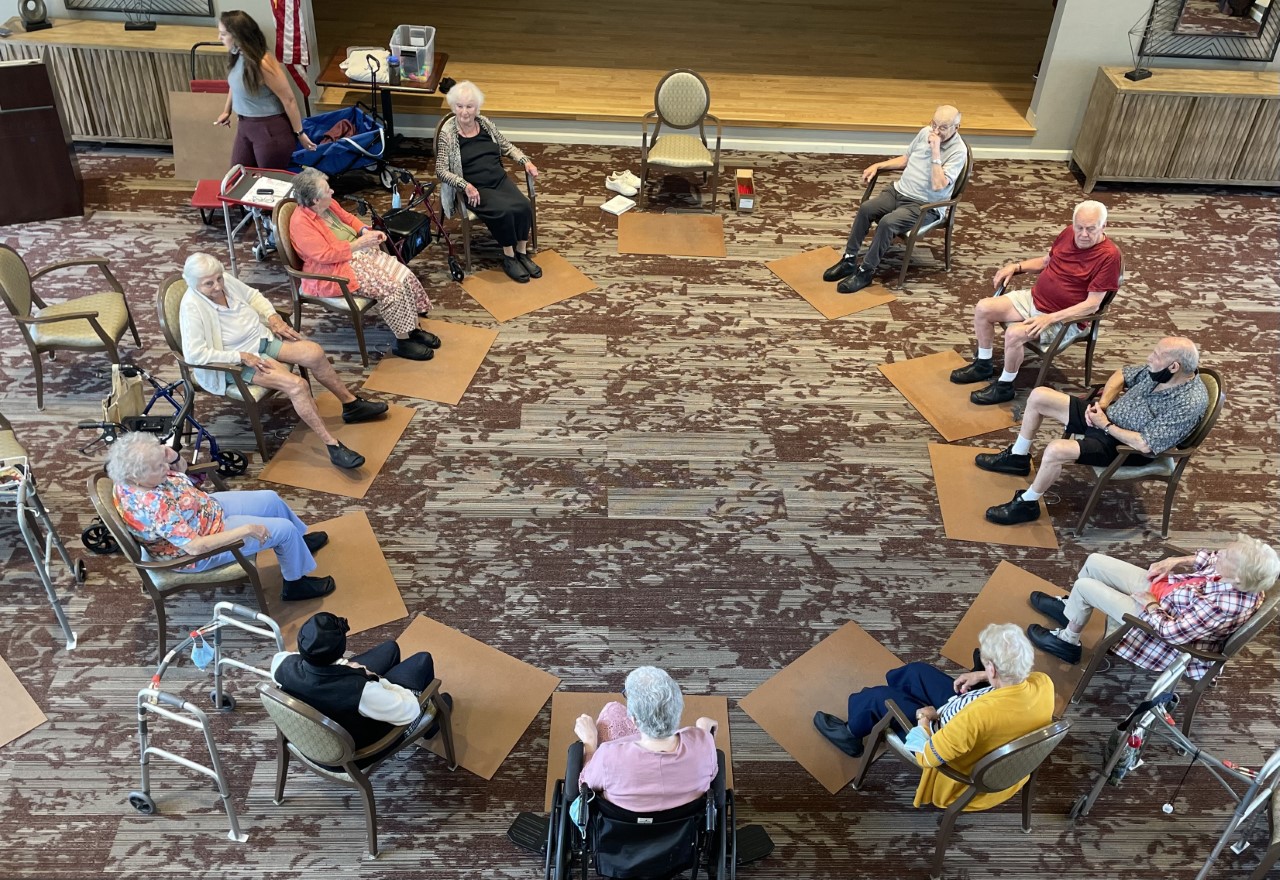One consequence of us living longer lives is there’s an increasing number of seniors who need long-term care.
While the care needs of people change as they age, staying at home and living independently for as long as possible is most often the desired goal—and there are options that can support that objective.
As your requirements evolve, there are also options for when you decide it is time to leave your private residence. Take the time now to understand your options. Here is an overview of long-term care alternatives to assist with your planning.
Get the Help You Need While Maintaining Independence
For those aging in place, it is very common to need help completing daily activities. Friends and family can provide some assistance, but care needs often extend beyond that support.
The decision to bring in help to aid with household chores and personal tasks can be a difficult one for many families to make, but it can bring peace of mind and keep seniors healthy, safe and active in the comfort of their own home.
Option: Private care
Private care, which usually involves the services of a home health aide, focuses on assisting with challenges presented by medical conditions rather than treatment of the medical conditions. A home health aide can serve as a bridge between a senior and their healthcare providers, allowing them to remain at home longer.
Private care does not require a doctor’s referral and is not typically covered by insurance, meaning the costs for such services are paid by the client or their family (out-of-pocket) or through long-term care insurance.

Not sure if a home health aide is necessary? Here are five scenarios in which private care can help.
- After an injury or diagnosis
- Memory problems
- No longer able to drive
- Signs of depression
- Social isolation
What private care offers
Home health aides, personal care homemakers, and companions can help in many ways, improving the quality of life for clients. Private care can be for up to 24 hours a day or for respite care, providing caregivers with peace of mind that loved ones are taken care of in their absence.
Private care services provided may include:
- Post-operative care and medical monitoring
- Alzheimer’s and dementia care
- Help with home exercise programs
- Personal care, grooming, and bathing assistance
- Light housekeeping
- Laundry
- Meal preparation
- Running errands
- Grocery or prescription pick-up
- Accompanying clients to medical appointments
- Medication and prescription reminders
- Companionship
When private care makes sense
When older adults choose to remain in their own homes, the support they need may be focused more on safety and assistance with daily tasks and companionship, rather than on medical care. These individuals may have health concerns or not, and an individualized plan of assistance is essential to maintaining independence.
Five Signs It’s Time to Bring In a Home Health Aide
Private care aims to meet the changing needs of people choosing to remain in their private residences as they age. General help around the home is one of the most common reasons seniors and their families choose to enlist the help of a home healthcare worker. Some people may choose to secure help for a designated period of time, such as after surgery, after a car accident, or after the loss of driving privileges.

Learn how private care can support independent living.
Moving forward with private care
When selecting private care from an agency, be sure to ask the following questions:
- Do you verify the professional certification of potential staff?
- Are your staff members bonded and insured?
- Do you conduct employment authorization and background checks when hiring?
- Do you provide ongoing training and supervision of your staff?
Life and circumstances change, sometimes quickly, and the care plan needs to be flexible and individualized to adjust to new requirements.
Since private care is paid by the client to the home health aide agency, you do not need a referral from the doctor or your insurance to receive these services.
Option: Visiting Nurse Association (VNA)
The VNA is home care, for people of all ages, including older adults, offering skilled nursing, rehabilitation services, home health aides and more, to meet temporary needs, and assist those with chronic illnesses and conditions.
VNA services are for those with specific medical needs who are referred by doctors to receive care processed through the client’s health insurance. VNA professionals discuss financial options available with each patient and their family, including Medicare and supplemental or long-term health insurance. For some, the cost of care is funded by personal savings and income or home equity. For others, financial aid may be available through state Medicaid programs, or the Veterans Affairs.
What VNA offers
The VNA begins with an initial visit with the client and family members. Patient care needs are discussed, and an individualized care plan, which may include household help and personal care assistance, is then created. Geriatric Care Management with monitoring of blood pressure, medication reminders, and more may also be included. The nurse may take vital signs, and dress wounds or bed sores.
A schedule of visits is then established based on each person’s needs. The visits are carefully documented to monitor progress and medication regimens. The goal for VNA nurses and other professionals working with them is to improve or restore independence for patients, allowing them to remain living safely in their own house, apartment, assisted living residence, or any other home setting.
VNA can also establish hospice services that focus on enhancing life and providing compassionate care for people entering the last stages of life.
VNA services include, but are not limited to:
- Post-operative care
- Advanced wound care
- Chronic disease management and education, for diseases such as cardiac disease, COPD, diabetes, and asthma
- Pain management
- Medication reconciliation, management, and education
- Mental health nursing
- Rehabilitation services
- Medical social services
- Personal care
- In-home vitals monitoring
- Fall prevention program

Learn more about how to choose the home care that is right for your situation.
When VNA makes sense
VNA professionals are devoted to meeting the diverse needs of people choosing to receive care in the comfort of their own homes. They work with your physician to provide a dynamic blend of rehabilitative, nursing, social service, and specialized care.
A visiting nurse must have an associate’s or bachelor’s degree and must pass national registered nurse licensing exams. Other professionals providing services are also licensed in their areas of expertise.
Moving forward with VNA
To receive VNA services, the patient must be under the care of a physician, and a physician’s order is required to confirm the healthcare services being requested are medically necessary. Some insurance carriers also require the patient to be considered “homebound,” meaning they have difficulty traveling outside their home to receive healthcare in their current situation.
A call to the Visiting Nurses Association can get the process started with the initial consultation to determine the appropriate level of care.
Option: Adult Day Health Care
For seniors who are living at home, adult day health care programs provide meaningful social interaction and substantial activities for stimulating the mind and exercising the body. Participants return home at the end of an active day.
Adult day health care provides meals, activities, and social interaction in a center where older adults are monitored by trained staff and licensed nurses. Door-to-door transportation is available.
Some forms of insurance will cover adult day health care; otherwise, the cost is paid out-of-pocket. No professional referral is needed to enter these programs, although there is an application process.
What adult day health care offers
Adult day health care allows older people and adults with disabilities a chance to leave the house and be involved, as well as have their specific needs met. Services delivered often extend beyond what the caregiver is equipped or able to do, including physical, occupational, or speech therapy; nutrition; and behavior management programs.
Individuals can:
- Participate in staffed activities such as music and exercise programs, games, day trips, and even pet therapy.
- Make new friends and enjoy new social interactions.
- Receive medical monitoring, grooming assistance, nutritious meals, mental and physical stimulation, and companionship.
When adult day health care makes sense
There is a growing recognition caregivers can’t always provide everything a senior or disabled adult living at home needs to lead a happy, fulfilling life.
Adult day health care offers an opportunity for those with Alzheimer’s disease and other forms of dementia to be social within a safe environment.
Adult day care programs can benefit seniors and caregivers.
Moving forward with adult day health care
Visit a location that has an adult day health care program for a tour and to discuss what the program offers. An application and medical report from a physician is required to get started, as well as insurance verification, if necessary and applicable.
Moving for More Care
There may come a time when your care needs are best met by living in a residence other than your current home.
Option: Assisted living

Assisted living is perfect for an older adult who may need some assistance with the activities of daily living, such as bathing or getting dressed, but still desires and can manage an active, engaging lifestyle. Meals are provided.
Often, there are several apartment styles including studio, one-bedroom, and companion suites.
Some forms of insurance will cover assisted living; otherwise, the cost is paid out-of-pocket. No referral is needed.
What assisted living offers
Assisted living provides personalized care that meets individual needs, as well as diverse programming that encourages residents to get involved, be connected, and thrive.
Amenities include:
- Personal care services provided by staff each day
- Three meals a day with snacks
- 24-hour, awake staff
- Routine safety checks
- Plentiful recreation activities
- Exercise programs
- Daily schedule of events
- Laundry
- Housekeeping
- Intergenerational programs
- Emergency response
- Health and wellness assessments
When assisted living makes sense
Assisted living provides a warm setting for older adults who may need some help with daily routines. If you are no longer able to cook for yourself or you would like help with managing your day-to-day personal care, assisted living could be the answer.
Private or shared apartments, care tailored to each person, delicious meals, recreation, social interaction, local transportation, and 24-hour emergency response create a comfortable, desirable environment.
Moving forward with assisted living
Schedule a tour of an assisted living community near you, discuss the support offered, and apply. Medical forms are required.
Option: Rehabilitation and Skilled Nursing Centers (Nursing homes)

Rehabilitation and Skilled Nursing Centers, also called nursing homes, provide an interdisciplinary approach to comprehensive restorative and medical care, delivered with a compassionate, respectful, highly personal attitude. They offer post-surgical care, complex medical management, rehabilitation, and short- or long-term skilled nursing.
This care is covered by nearly all forms of insurance, including Medicare and Medicaid, and a medical referral is required.
What nursing home care offers
Nursing homes deliver a blend of rehabilitative nursing care and restorative care, social services, therapeutic recreation, and specialized care. Nurses, social workers, therapists, and dining and recreation staff work with each resident, their physician, and their family to enhance the person’s experience at every level.
Nursing home services include:
- On-site nursing staff 24 hours a day
- Medication management, monitoring, and administration
- Physical, occupational, and speech-language therapies
- Assistance with bathing, dressing, and grooming
- Balanced, therapeutic meals, and snacks
- Housekeeping, linen, and laundry services
- Participation in social and recreational activities
When nursing home care makes sense
When a family member needs long-term care, deciding what’s best can be a challenge. Nursing homes can provide valuable information and thoughtful guidance.
This option provides extended stays for people who require significant medical care, need support with performing typical daily activities, and/or demonstrate challenges preventing a safe return to their prior living arrangement.
Moving forward with nursing home care
Nursing home care requires a referral from a physician. Visit the nursing home under consideration to discuss the next chapter of care for yourself or someone important to you.
More Long-term Care Resources
Here is additional information to help understand and plan for your long-term care.
Read long-term care resource guides.
- Peruse a comprehensive resource on long-term care planning
- Learn more about planning for long-term care
- Read a guide on long-term care planning
Learn even more about your options.
Be proactive and make a plan for your future care. Discuss your options with your loved ones and let everyone know how you see your future and how you would like your needs to be met.
In addition to assisted living, adult day health care and skilled nursing, SALMON Health and Retirement offers home care options through SALMON Private Care Options and SALMON VNA and Hospice.
To learn more about the different services available to you and your loved ones, contact us today by calling 888-587-2061 for more information.
About Us
Organizations such as SALMON Health and Retirement are ready and able to offer assistance so your loved one can have their best life possible, even as their needs increase. SALMON Health and Retirement provides a full spectrum of senior living choices and helps support your caregiving efforts. To learn more about the options available to you and your loved ones, contact us today by calling 888-587-4409 for more information.



